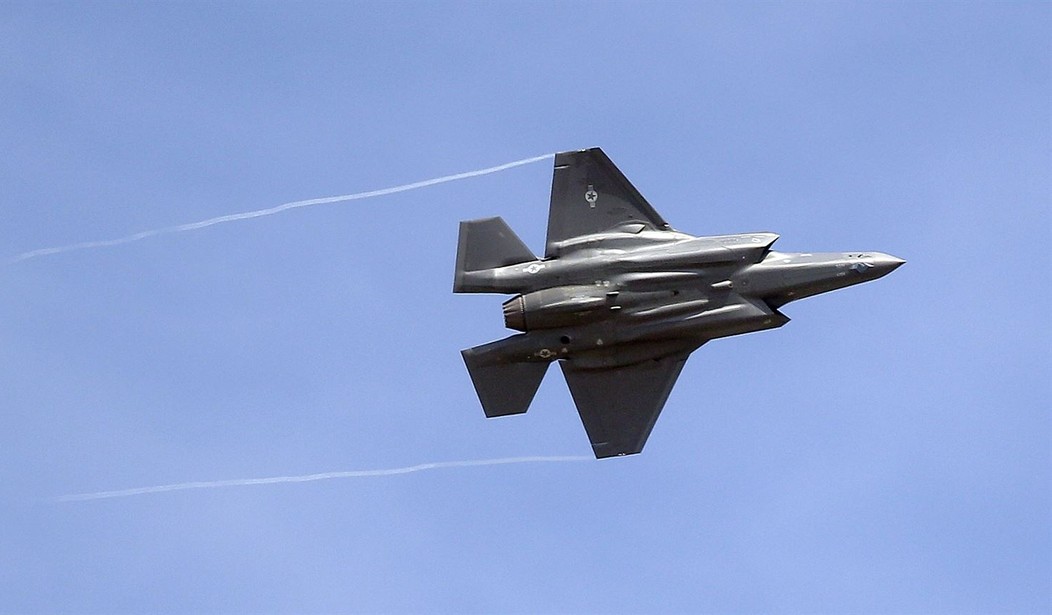Cost overruns happen in private sector and government contracting. But only with government contracts could a service run tens of billions over budget with no suit for breach of contract nor any other penalty. It is an accepted practice for government contractors to run over budget.
When it is convenient, allies of big government Pentagon programs will ask the American people to gloss over government incompetence in the name of national defense. This is at a time when the ever-increasing debt burden on the American people has become a serious national security threat. If the economy goes belly up, there will be no way to pay for any new defense programs.
The F-35 Joint Strike Fighter program is one of these programs that has fallen subject to a government contract run amok. That program is estimated to cost $10 billion over budget in the next five years. Only in Washington would some excuse a ten-billion-dollar budgeting error. This program is a great example of why the federal government is expected to not blink an eye when they run a deficit for this year that will be a record $3 trillion.
While some are willing to pay as much as possible for shiny new fighter jets that overpromise results, the taxpayers are hurting, and workers are struggling. Bloomberg reported on September 11, 2020, “the Pentagon’s five-year budget plan for the F-35 falls short by as much as $10 billion, the military’s independent cost analysis unit has concluded, a new indication that the complex fighter jet may be too costly to operate and maintain.” This is a program that is estimated to cost about $1.2 trillion over the lifetime of the program.
Washington defense hawks think it is okay to spend money we don’t have on a program rife with flaws. The Heritage Foundation’s Steve Bucci wrote in Defense News on September 1, 2020, “Why spend more for less? This is critical because over the next five years, the number of F-35s purchased will more than double to approximately 1,200 aircraft. That translates to increased capacity and capability for the United States and its allies as they operate in the Indo-Pacific and European theaters.” The big problem with that argument is that all the money the federal government has thrown at the program has not solved some serious design flaws.
Recommended
The design flaws are expected to burden the program with even more costs and delays over the next few years. F-35 contractor Lockheed Martin admitted that “the most widely used variant of the F-35 Joint Strike Fighter is currently unable to fly in thunderstorms after the discovery of damage to one of the systems it uses to protect itself from lightning.” In addition, it was reported that the F-35s have trouble flying at supersonic speeds under certain conditions. Add in the fact that a $17 billion diagnostic system that does not even work and you have a program that is not worth the cost.
One of the reasons why our federal government is running record debt is that politicians in Washington don’t care about restraining spending. Even with the necessary expenditure created by the coronavirus, there was no effort by the federal government to save up for a crisis like the one we face today. Politicians merely held hands and voted for legislation that will result in a record deficit for the year of over $3 trillion and an accumulated debt that is approaching $27 trillion.
Groups like The Heritage Foundation have written in the past about the debt including a recent one titled “New Report Shows Why Congress Must Address National Debt.” The authors in that paper concluded that “the deficit for 2020 is expected to reach $3.3 trillion, or over $25,000 per household. As a share of the economy, this deficit is the largest since World War II,” and “as the U.S. emerges from this pandemic, lawmakers will need to take a serious reckoning of the federal budget.” They recommend a study of entitlement programs but could look to the F-35 Joint Strike Fighter program for one easy place to find tens of billions of savings by modestly cutting back the program without hurting national defense.
Cost overruns should not be tolerated when using taxpayer funds and the F-35 Joint Strike Fighter program is in dire need of an audit to find some savings.

























Join the conversation as a VIP Member